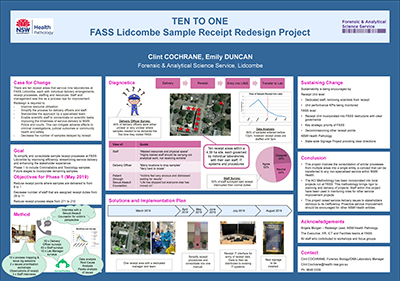Ten to one: FASS Lidcombe sample receipt redesign project
Summary
To simplify and consolidate the receipt process for criminalistics and toxicology samples at the Forensic & Analytical Science Service (FASS) Lidcombe by improving efficiency, streamlining service delivery and enhancing the stakeholder experience.
View a poster from the Centre for Healthcare Redesign graduation, May 2019.
Aim
Phase 1 aims
- To reduce sample receipt areas from six to one.
- Decrease number of staff that are assigned receipt duties from 28 to 11.
- Reduce receipt process steps from 271 to 210 by May 2019.
Additional phases
- To incorporate remaining services after May 2019.
Benefits
- Reduction of resources dedicated to sample receipt processes
- One delivery point for delivery officers
- Simplified and streamlined receipt processes
- Use scientific staff to perform scientific testing, rather than administrative receipt tasks
- Specialised receipt unit with a dedicated receipt manager.
Background
The FASS Lidcombe site is made up of 10 receipt areas that service nine separate laboratories. Each area has individual delivery arrangements, receipt processes, staffing and resources. These factors lead to internal considerations around inefficiencies when it comes to the duplication of process and resources. In the year before this project, sample submission increased by up to 20%, however staffing remained static and five of the nine laboratories did not comply with at least some of their key performance indicators. Process improvement is required to ensure targets are achieved.
FASS Lidcombe provides a fragmented receipt process that is ripe for improvement. This would benefit our stakeholders who deliver samples. Delivery stakeholders require awareness of different locations, opening hours and processes for each discipline. This has led to stakeholder confusion and frustration.
FASS analyses samples related to court proceedings and public health testing for the NSW community. Efficiency and accuracy in the delivery of samples is critical to maintaining sample integrity, as well as preserving the chain of custody which legislation and courts require. Deviations from ideal delivery practice may adversely impact the evidential value of samples. This in turn may compromise criminal investigations, judicial outcomes or community health and safety.
Implementation
- A team of dedicated receipt staff was created, who are cross-trained in the reception of different sample types – implemented March 2019.
- A receipt unit manager position was created to manage rosters and schedules, performance management and stakeholder engagement – implemented March 2019.
- Forensic Biology/DNA, Illicit Drugs and Chemical Criminalistics samples are to be consolidated into one location by May 2019. All remaining receipt areas to be consolidated following the refurbishment of the receipt unit.
- Streamline and simplify receipt protocols for each sample type and create a consolidated and standardised receipt manual.
- New signage and campus map to be installed.
- An IT interface is to be created, which uses NSW Police data for receipt, and exports data into existing IT systems. This will simplify receipt entry and decrease manual data entry.
Status
Implementation - The initiative is ready for implementation, is currently being implemented, piloted or tested.
Dates
Phase 1
- Start of project – 12 April 2018
- End of project (phase I) – 31 May 2019
- Receipt unit manager started – 18 March 2019
- Centralised receipt unit launched – 18 March 2019
- Forensic biology/DNA and illicit drugs analysis samples incorporated – 18 March 2019
Later phases will incorporate the remaining receipt services at FASS Lidcombe into the receipt unit, as overseen by the receipt unit manager.
Implementation site
Forensic & Analytical Science Service, Lidcombe, NSW Health Pathology
Partnerships
Evaluation
Results are being actively monitored throughout the implementation process, and evaluation will assess achievement.
Some solutions, such as IT interface, are unlikely to be completed by 31 May 2019 but will be implemented later in 2019.
Solutions will be measured by assessing the:
- amount of staff with receipt duties
- receipt competencies achieved by cross-skilled staff
- services incorporated into the receipt unit
- number of steps within receipt manual
- percentage of samples delayed by more than 24 hours due to data issues.
Lessons learnt
- Be clear and realistic with the scope of the project with all participants.
- Regular communication, consultation and engagement is key to getting staff buy-in with the project. It is essential to start this as soon as possible and update everyone regularly.
- Planning is essential to meet deadlines and ensure the project runs smoothly. Don’t underestimate how much time this takes and how much work there is to do.
- You can’t do it all yourself, engage with people who can help with the project.
- Tackle the longest and hardest jobs first.
- Plan for contingencies. Problems will arise, project members will become unavailable unexpectedly and apparent small issues will become difficult to resolve. Make sure you have planned sufficient time and have a large enough project team to overcome complications.
- Be very aware of your organisation’s competing priorities. These other priorities will heavily influence the timeliness of the implementation of project solutions.
Contact
Clint Cochrane
Forensic Biology/DNA Laboratory Manager
Forensic & Analytical Science Service
NSW Health Pathology
Phone: 02 9646 0339
Clint.Cochrane@health.nsw.gov.au
